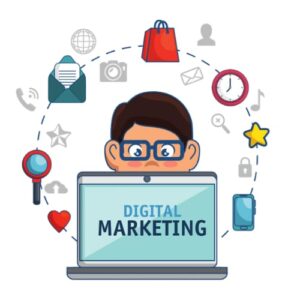How to Become a Digital Marketer: A Step-by-Step Guide

In today’s technology-driven world, businesses are increasingly relying on digital marketing to reach their target audiences. Whether you’re looking to start a new career or shift your current focus, becoming a digital marketer offers a wealth of opportunities. Here’s a step-by-step guide to help you navigate the path to becoming a successful digital marketer.
1. Understand the Basics of Digital Marketing
Digital marketing encompasses various channels, including search engines, social media, email, and content marketing. Start by familiarizing yourself with the fundamental concepts:
- SEO (Search Engine Optimization): Techniques to increase a website’s visibility on search engines.
- SEM (Search Engine Marketing): Paid strategies to improve search engine ranking.
- Social Media Marketing: Promoting products/services through social media platforms.
- Content Marketing: Creating and distributing valuable content to attract a targeted audience.
- Email Marketing: Using email to promote products/services and build relationships with customers.
2. Acquire the Necessary Skills
Digital marketing requires a blend of creative and analytical skills. Some key skills include:
- Analytical Thinking: Ability to analyze data and make data-driven decisions.
- Creativity: Crafting engaging content and compelling campaigns.
- Communication: Clear and persuasive messaging is crucial.
- Technical Skills: Understanding how to use various digital tools and platforms, such as Google Analytics, SEO tools, social media schedulers, and email marketing software.
3. Take a Course or Certification
Formal education in digital marketing is not mandatory, but it can be beneficial. There are many online courses and certifications that can give you a structured learning experience:
- Google Digital Garage: Free courses covering basics of digital marketing.
- HubSpot Academy: Offers various free certifications in content marketing, inbound marketing, and more.
- Coursera: Offers paid courses in partnership with top universities.
Earning certifications in specific areas like Google Ads, Facebook Blueprint, or HubSpot’s Inbound Marketing can set you apart in the job market.
4. Build a Strong Online Presence
A digital marketer should have a strong online presence that reflects their skills. Start by:
- Creating a Personal Website: Showcase your portfolio, blog, and achievements.
- Active Social Media Presence: Engage with industry experts, share insights, and build your personal brand.
- Starting a Blog: Write about digital marketing trends, tools, and strategies to establish yourself as a thought leader.
5. Gain Practical Experience
Nothing beats hands-on experience. Look for internships, freelance projects, or volunteer opportunities to work on real campaigns. This will help you:
- Apply Your Knowledge: Implement what you’ve learned in real-world scenarios.
- Build a Portfolio: Document successful campaigns and projects.
- Learn from Mistakes: Gain insights from the challenges you encounter.
6. Stay Updated with Industry Trends
Digital marketing is constantly evolving. Subscribe to industry blogs, listen to podcasts, and attend webinars to stay informed about the latest trends and best practices. Some key resources include:
- Moz Blog: Offers insights into SEO and content marketing.
- Neil Patel’s Blog: Provides tips and strategies for digital marketing.
- MarketingProfs: Covers various aspects of digital marketing with in-depth articles.
7. Network with Other Professionals
Networking is essential in digital marketing. Join online forums, attend industry events, and participate in webinars to connect with other professionals. Networking can lead to job opportunities, collaborations, and valuable mentorship.
8. Specialize in a Niche
As you gain experience, consider specializing in a particular area of digital marketing, such as SEO, PPC, social media marketing, or email marketing. Specialization can make you more valuable to employers or clients, as you’ll be seen as an expert in your chosen field.
9. Seek Out a Mentor
Find a mentor who has experience in digital marketing. A mentor can provide guidance, answer questions, and offer valuable insights that you might not get from formal education or online courses.
10. Consider Freelancing or Starting Your Own Agency
Once you have enough experience, consider freelancing or even starting your own digital marketing agency. This allows you to work with multiple clients, set your own rates, and gain a wider range of experience.
Final Thoughts
Becoming a digital marketer requires dedication, a willingness to learn, and the ability to adapt to new trends and technologies. By following these steps, you’ll be well on your way to building a successful career in digital marketing. The key is to start now, stay curious, and continuously refine your skills.
Feel free to tailor the blog post further or add specific examples relevant to your experience or goals!